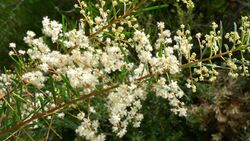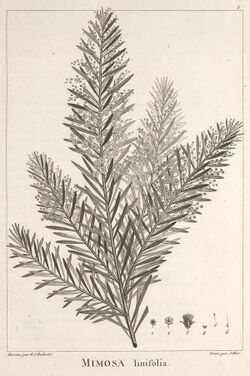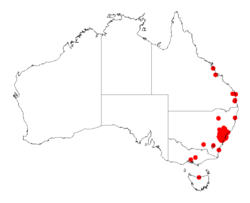Biology:Acacia linifolia
| Acacia linifolia | |
|---|---|

| |

| |
| (Artist:Redouté)[1] | |
| Scientific classification | |
| Kingdom: | Plantae |
| Clade: | Tracheophytes |
| Clade: | Angiosperms |
| Clade: | Eudicots |
| Clade: | Rosids |
| Order: | Fabales |
| Family: | Fabaceae |
| Subfamily: | Caesalpinioideae |
| Clade: | Mimosoid clade |
| Genus: | Acacia |
| Species: | A. linifolia
|
| Binomial name | |
| Acacia linifolia (Vent.) Willd.
| |

| |
| Occurrence data from AVH | |
Acacia linifolia, known colloquially as white wattle, or flax wattle, is a species of Acacia native to eastern Australia.[2]
Description
The shrub typically grows to a height of 1.5 to 4 m (4 ft 11 in to 13 ft 1 in) and has an erect or spreading habit with greyish coloured smooth or finely fissured bark and glabrous or sometimes hairy, finely ridges branchlets that are angled towards the apices. Like most species of Acacia it has phyllodes rather than true leaves. The glabrous and evergreen phyllodes have a more or less linear shape with a length of 2 to 5 cm (0.79 to 1.97 in) and a width of 0.7 to 2.5 mm (0.028 to 0.098 in) and have a prominent midvein. The inflorescences occur in groups of 5 to 17 in an axillary raceme and have spherical flower-heads with a diameter of 4 to 5.5 mm (0.16 to 0.22 in) containing 6 to 12 pale yellow to white coloured flowers. The glabrous, thinly leathery seed pods that form after flowering are often covered in a fine white powdery coating and are straight or curved and more or less flat but are raised over the seeds. The pods are 3 to 12 cm (1.2 to 4.7 in) in length and 8 to 15 mm (0.31 to 0.59 in) wide. and contain longitudinally arranged seeds.[2]
Taxonomy
Acacia linifolia was first described in 1800 by Étienne Pierre Ventenat as Mimosa linifolia.[3][1] In 1806 Carl Ludwig Willdenow redescribed it as belonging to the genus, Acacia, and it became Acacia linifolia.[3][4] The specific epithet is in reference to the shape of the phyllodes that are similar to the leaves of flax plants. The species is quite similar in appearance to Acacia boormanii and Acacia meiantha.[2]
Distribution
It is found in New South Wales and has a range that extends from around the Hunter Valley in the north down to around the Hill Top area and is quite common around Sydney. It is usually found as a part of dry sclerophyll forest or heathland or open, woodland communities growing in skeletal sandy soils over or around sandstone or in clay soils over or around shale.[2]
See also
References
- ↑ 1.0 1.1 Ventenat, E.P. (1800) Description des Plantes Nouvelles et peu connues, cultivees dans le Jardin de J.M. Cels 1: 2 t. 2
- ↑ 2.0 2.1 2.2 2.3 Harden, Gwen J. (1990). "Acacia linifolia (Vent.) Willd.". Plantnet - New South Wales Flora Online. Royal Botanic Gardens, Sydney. http://plantnet.rbgsyd.nsw.gov.au/cgi-bin/NSWfl.pl?page=nswfl&lvl=sp&name=Acacia~linifolia. Retrieved 17 July 2014.
- ↑ 3.0 3.1 "Acacia linifolia". Australian Plant Name Index (APNI), IBIS database. Centre for Plant Biodiversity Research, Australian Government. https://biodiversity.org.au/nsl/services/rest/name/apni/65877.
- ↑ Willdenow, C.L. (1806). "Acacia linifolia". Species Plantarum Edn. 4 4 (2): 1051. https://bibdigital.rjb.csic.es/viewer/12439/?offset=#page=420&viewer=picture&o=bookmark&n=0&q=.
Wikidata ☰ Q9566393 entry
 |

